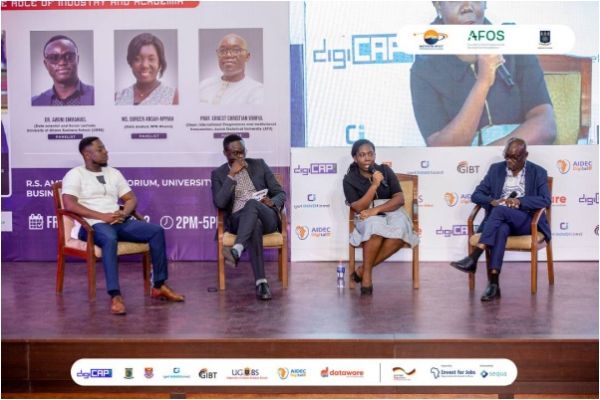In a momentous occasion, experts gathered at the 8th edition of the industry and academia tech dialogue, INDACTED, to advocate for businesses and organizations to fully embrace AI as an essential component for survival and growth in the data-driven era.
Under the theme ‘Transforming Businesses with Data Analytics and AI: The Role of Industry and Academia,’ the event featured thought-provoking discussions and presentations from industry leaders and professionals, highlighting the transformative power of AI and data analytics across various sectors.
Kwesi Kwofie, CEO of Dataware Tech and Guest Speaker, emphasized the immense potential of AI in enabling organizations to conduct detailed-oriented analyses, expediting decision-making processes by reducing the time spent manually sifting through vast amounts of data.
However, he also acknowledged the challenges that must be addressed to fully harness AI’s capabilities. Mr. Kwofie stressed the need for businesses to invest in data literacy for their human resources to effectively leverage data-driven insights. He urged companies to foster a data-driven culture to unlock the true value of data and AI.
One of the major challenges discussed during the event was the issue of data accessibility. Many organizations face hurdles in using data to create AI-driven solutions due to data silos within various departments. “Together with fostering a company culture of being data-driven, we believe that we must begin to build data literacy into every person in the organisation to help them appreciate data and insights better,” he said.
“Data accessibility is a problem that we face in our efforts to use data and AI because it prevents businesses like ours from using data to create solutions for the market that are driven by AI. Because each department has its own data and is unable to use it, data for the majority of organisations are languishing in silos. Even when data is available, there is the problem of obtaining data quality, and we need answers to this,” he added.
Ambrose Yennah, Executive Chairman for AIDEC Digital, pointed out that AI and other emerging technologies will create new types of jobs, necessitating the retraining of the workforce in digital skills to stay relevant in the AI era.
“Those who refuse to transform will become dysfunctional and experience job losses. AI-enabled systems as in electronic procurement solutions can be a development tool in terms of job creation, cost savings and freeing of resources for development. Setting up a threshold on procurement contracts to be given to local companies can have a multiplier effect in developing our economies and creating jobs for the teaming unemployed youth including University graduates,” he explained.
The Institute for ICT Professional Ghana (IIPGH), in collaboration with AFOS Foundation and digiCAP, has been at the forefront of promoting dialogue and collaboration between industry and academia. The partnership between IIPGH and AFOS Foundation is supported by the German Federal Ministry for Economic Cooperation and Development (BMZ) within the framework of the Special Initiative ‘Decent Work for a Just Transition’ via sequa gGmbH.
David Gowu, Executive Director for IIPGH, highlighted the significance of such events in fostering innovation, knowledge-sharing, and workforce preparedness for the future. “This platform that we have designed is to bridge the gap between industry and academia and we have experts to share their knowledge on everything related to AI and Data Analytics and by facilitating these conversations, we aim to inspire businesses and academia to collaborate and embrace these technologies to drive growth and innovation,” he added.
Panel Discussion
The event also featured a panel discussion, where Professor Ernest Christian Winful from Accra Technical University (ATU) pointed out the importance of redesigning school curricula to produce graduates equipped with skills demanded by the job market.
“One way to bridge the gap in academia goes beyond organising workshops. We need an industry-driven curriculum to help bridge these gaps. But what we have been doing as an institution so far is to team up with experts who are more advanced in curriculum and allow our students to pair and perform projects in line with these new developments,” he added.
Industry professional, Doreen Ansah-Appiah a Data Analyst with MTN Ghana highlighted the need for industries to keep pace with emerging trends to contribute to economic growth.
Furthermore, Emmanuel Awuni Kolog, Data Scientist, and Lecturer at the University of Ghana Business School stressed the pivotal role of collaboration between industry and academia in harnessing the full potential of data analytics and AI.
The 8th quarterly tech dialogue provided a platform for participants to share their successful experiences of implementing data analytics and AI solutions in their respective industries. Attendees engaged in lively discussions, exchanged ideas and gained valuable insights from experts who have effectively integrated these technologies into their business strategies.
Source: Peacefmonline.com
| Disclaimer: Opinions expressed here are those of the writers and do not reflect those of Peacefmonline.com. Peacefmonline.com accepts no responsibility legal or otherwise for their accuracy of content. Please report any inappropriate content to us, and we will evaluate it as a matter of priority. |
Featured Video


















